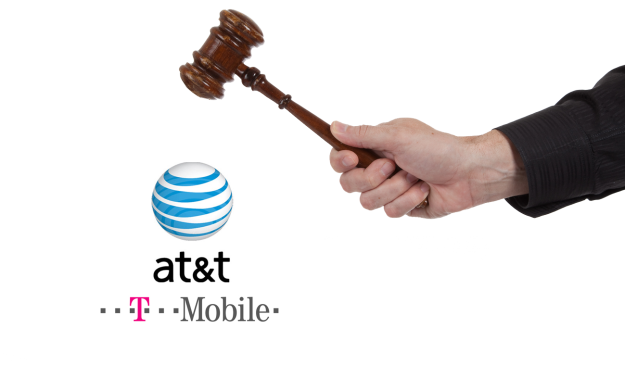
AT&T may not be allowed to buy T-Mobile, after all. The US Justice Department has filed an antitrust complaint to block AT&T, the second largest wireless carrier in the US, from purchasing T-Mobile USA Inc. from Deutsche Telekom AG for $39 billion, reports Bloomberg. The complaint says the deal would “substantially lessen competition” in the wireless market.
According to the complaint, which was filed today at a federal court in Washington D.C., the merger of the two wireless companies would violate US antitrust laws. If approved, the merger would have made AT&T the largest wireless company in the US, after the current leader, Verizon Wireless.
“The combination of AT&T and T-Mobile would result in tens of millions of consumers all across the United States facing higher prices, fewer choices and lower quality products for mobile wireless services,” said James M. Cole, the deputy attorney general, in an official statement. “Consumers across the country, including those in rural areas and those with lower incomes, benefit from competition among the nation’s wireless carriers, particularly the four remaining national carriers. This lawsuit seeks to ensure that everyone can continue to receive the benefits of that competition.”
Much of the complaint centers on the competitive relationship between AT&T and T-Mobile. According to the Justice Department’s filing, the two companies currently compete for customers in 97 of the nation’s 100 largest cell phone markets. In addition, T-Mobile has put pressure on the wireless industry as a whole by offering a wide variety of “firsts” to the market, including the first Android handset, national Wi-Fi hotspot access, unlimited service plans and the first nationwide HSPA+ high-speed wireless network.
News of the Justice Department’s blockage of the deal comes just as AT&T made a desperate vow to bring 5,000 new jobs back to the United States as an attempt to persuade federal regulators to approve the deal. AT&T faces penalties of between $3 billion and $6 billion if the deal falls apart.
UPDATE 1: AT&T’s senior counsel Wayne Watts, has issued a comment on the Justice Department’s decision to file the suit. The full text, below:
“We are surprised and disappointed by today’s action, particularly since we have met repeatedly with the Department of Justice and there was no indication from the DOJ that this action was being contemplated. We plan to ask for an expedited hearing so the enormous benefits of this merger can be fully reviewed. The DOJ has the burden of proving alleged anti-competitive affects and we intend to vigorously contest this matter in court. At the end of the day, we believe facts will guide any final decision and the facts are clear. This merger will:
· Help solve our nation’s spectrum exhaust situation and improve wireless service for millions.
· Allow AT&T to expand 4G LTE mobile broadband to another 55 million Americans, or 97% of the population;
· Result in billions of additional investment and tens of thousands of jobs, at a time when our nation needs them most.
We remain confident that this merger is in the best interest of consumers and our country, and the facts will prevail in court.”
UPDATE 2: FCC Chairman Julius Genachowski issued the following email after the Justice Department’s filing:
By filing suit today, the Department of Justice has concluded that AT&T’s acquisition of T-Mobile would substantially lessen competition in violation of the antitrust laws. Competition is an essential component of the FCC’s statutory public interest analysis, and although our process is not complete, the record before this agency also raises serious concerns about the impact of the proposed transaction on competition. Vibrant competition in wireless services is vital to innovation, investment, economic growth and job creation, and to drive our global leadership in mobile. Competition fosters consumer benefits, including more choices, better service and lower prices.
[Image via Mike Flippo/Shutterstock]
Editors' Recommendations
- 5G coverage map: Where you can get 5G on Verizon, AT&T, T-Mobile
- With Sprint merger done, John Legere steps down as T-Mobile CEO
- Report: Judge to rule in favor of Sprint/T-Mobile merger
- T-Mobile promises free 5G for first responders if Sprint merger goes through
- Digital Trends Live: T-Mobile/Sprint merger, Ford’s manual EV, and more


